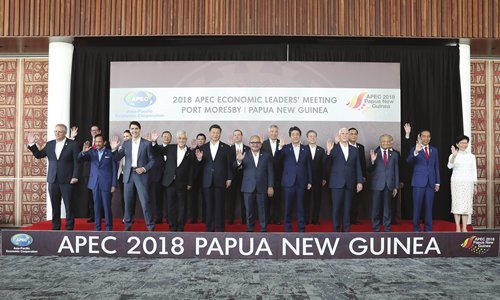Xi calls for ‘higher-level’ cooperation
By Huang Ge Source:Global Times and People’s Daily
Chinese President Xi Jinping (fifth from left) and other participants pose for a “family photo” during the 2018 APEC Economic Leaders’ Meeting in Port Moresby, Papua New Guinea on Sunday. Photo: Xinhua
Chinese President Xi Jinping called on the Asia-Pacific Economic Cooperation (APEC) economies on Sunday to bring their cooperation to a higher level based on a keen appreciation of the trend of the world and its economy.
Experts said Asia-Pacific countries and regions are expecting to see a wider scope of cooperation through opportunities provided by the China-proposed Belt and Road initiative (BRI).
Underlining the trend of economic globalization and economic integration in the region, Xi urged the economies to keep the momentum of Asia-Pacific cooperation in a speech he delivered at the 26th APEC Economic Leaders’ Meeting held in Port Moresby, capital of Papua New Guinea (PNG) on Sunday, the Xinhua News Agency reported.
The Chinese president said that the economies need to advance economic integration in the region so as to build an open economy in the Asia-Pacific.
“We should continue to promote trade and investment liberalization and facilitation,” Xi said.
Xi urged APEC members to improve their network of connectivity to promote inclusive and interconnected development, and to forge a closer partnership and jointly meet common challenges, according to the Xinhua report.
Su Ge, chairman of the Beijing-based China National Committee for Pacific Economic Cooperation, told the Global Times at the summit that “economies around the globe are highly integrated, interdependent and share common interest.”
Su said development is the common pursuit of each country instead of a game that some win while others lose.
Economic globalization will maintain momentum in the future, Su noted.
The Chinese government has shown its resolute determination at home and abroad to strengthening its opening-up, which will help drive the country to further improve its business environment and enhance trade and investment liberalization and facilitation, said Bai Ming, a research fellow at the Chinese Academy of International Trade and Economic Cooperation.
South Pacific countries are small that need cooperation with others to advance economic growth, Bai told the Global Times on Sunday.
“Ties between countries in the region need to upgrade to a new level and the BRI can offer such a platform,” he said, noting that Asia-Pacific countries and regions can cooperate in a wider scope than ever before through the BRI.
No debt trap
APEC is at a critical stage of development and all parties should demonstrate a responsible and constructive attitude, bearing in mind the original intention of APEC and grasping the direction of Asia-Pacific development, Hua Chunying, spokesperson of China’s Ministry of Foreign Affairs, said in a statement released on Sunday.
Hua’s comment came after US Vice President Mike Pence said Saturday during a speech at the APEC CEO summit that China creates debt burdens for Pacific island countries.
“No country either in the Asia-Pacific region or in any other region is falling into a debt trap because of its cooperation with China,” Wang Xiaolong, an official with the Ministry of Foreign Affairs, told a media briefing in Port Moresby on Sunday.
When asked by a foreign reporter if China’s aid in the region may improve its influence and change the current order of the area, Wang said that China is a developing country helping fellow developing countries, “in this region on infrastructure development, enhancing industry capacity, and improving the general welfare of local people.”
“We never touch political areas,” Wang said.
Clifford Faiparik, a reporter with PNG’s local newspaper The National, told the Global Times on Sunday that “we really appreciate China’s aid to us because we definitely need the funding to help us improve our social living standard, in education and health.”
China is helping fund infrastructure, which PNG lacks and the assistance is very timely, Faiparik noted.
“When we have good infrastructure, we have economic activities,” he said. “We have good products in remote areas, such as coffee and fruits but now we do not have roads for access to market. But the BRI can help with that by supporting local infrastructure construction.”
“We local people do appreciate it,” he said.
“To deal with international issues, we must follow the rules created in common and differences should be resolved through talks,” Hua said in the statement released on Sunday, noting that countries should not set up artificial barriers.













